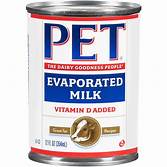What is Pet Milk?
Pet milk, also known as evaporated skimmed milk for pets, is a dairy product specially formulated for animal consumption. It is not intended for human consumption and can be found in the pet food section of grocery stores and pet supply stores.

Nutritional Composition
Pet milk is typically made from cow's milk that has been processed to remove most of the fat and water. This results in a concentrated milk product that is high in protein, calcium, and other essential nutrients. The exact nutritional composition of pet milk can vary depending on the brand and type, but it typically contains the following:
- Protein: 8-12% - Fat: 0.5-2.5% - Carbohydrates (mainly lactose): 10-15% - Calcium: 250-350 mg/cup - Phosphorus: 200-250 mg/cup - Vitamin D: 400-600 IU/cupBenefits of Pet Milk for Animals
Pet milk can provide several benefits for animals, including:
- Providing essential nutrients: Pet milk is a rich source of protein, calcium, and other nutrients that are essential for animal health. It can be especially beneficial for growing puppies and kittens, pregnant or nursing animals, and animals recovering from illness or injury. - Supporting digestive health: Pet milk can help to support digestive health in animals by providing them with beneficial probiotics and prebiotics. These microorganisms can help to maintain a healthy balance of gut bacteria, which can promote digestive regularity and reduce the risk of gastrointestinal issues. - Providing hydration: Pet milk can help to provide animals with hydration, especially if they are not drinking enough water. It can also be used to rehydrate animals who have been vomiting or have diarrhea. - Enhancing palatability: Pet milk can be used to enhance the palatability of food for animals who are reluctant eaters. It can be added to dry or wet food to make it more appealing and encourage animals to eat more.How to Use Pet Milk
Pet milk can be used in a variety of ways to benefit animals, including:
- Feeding puppies and kittens: Pet milk can be used to supplement the mother's milk for puppies and kittens or as a complete replacement if the mother is unable to nurse. It should be fed to puppies and kittens in small amounts, several times a day. - Supporting pregnant or nursing animals: Pet milk can be used to provide additional nutrients for pregnant or nursing animals to help them meet the increased demands of pregnancy and lactation. It can be offered to them as a supplement to their regular food. - Rehydrating animals: Pet milk can be used to rehydrate animals who have been vomiting or have diarrhea. It can be offered to them in small amounts, several times a day. - Enhancing palatability: Pet milk can be added to dry or wet food to make it more appealing and encourage animals to eat more. It can also be used to make treats for animals.Important Considerations
While pet milk can be a beneficial addition to an animal's diet, it is important to use it in moderation. Overfeeding pet milk can lead to health problems, such as obesity, diarrhea, and nutritional imbalances. It is also important to choose pet milk that is specifically formulated for animals, as human milk and other dairy products can be harmful to animals.
If you are considering using pet milk for your animal, talk to your veterinarian to discuss the appropriate amount and frequency of feeding. They can help you determine if pet milk is right for your animal and how to use it safely.
Declaration: All article resources on this website, unless otherwise specified or labeled, are collected from online resources. If the content on this website infringes on the legitimate rights and interests of the original author, you can contact this website to delete it.



